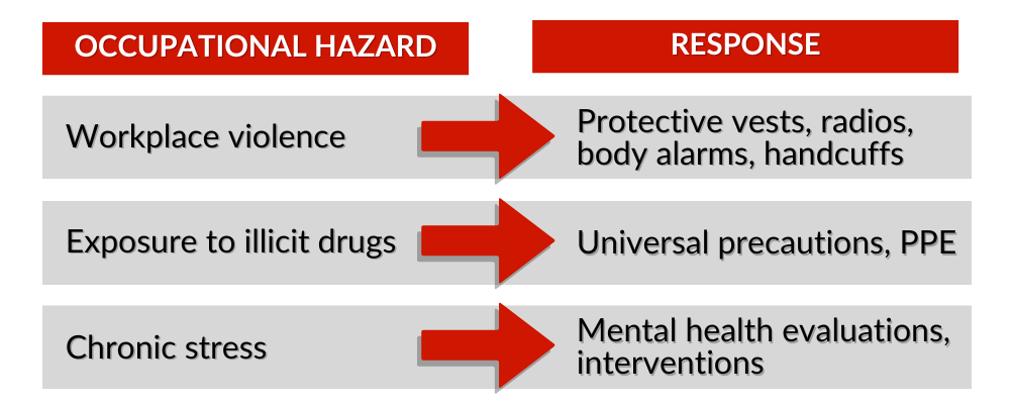Are You Meeting Officer Wellness Mandates?
Mandates and legal precedents are pushing for a bigger focus on mental health when it comes to occupational health interventions for jail staff. Some states now require yearly routine wellness checkups to normalize reactions to the on-the-job stress, mental health, and self-care. These checkups are intended to help ensure that staff are mentally and physically prepared for the demands of their roles.
Require yearly officer wellness checkups
Nearly 45% of correctional officers report witnessing or experiencing a coworker’s suicide in a typical year.1 In light of the high burnout and suicide rates in corrections, more states are including mental health assessments in occupational health guidelines for routine checkups.
Each job comes with its own benefits and occupational hazards. For example, coal miners may experience cave-ins or inhale toxic fumes. Occupational health regulations exist to reduce physical exposure to these incidents, like mandatory ventilation inspections or protective equipment. Similarly, regulations regarding officer mental health aim to address the stressful workload correctional professionals are faced with daily. Take a proactive approach and require yearly officer wellness checkups to include mental health screening.
CIERR is always here
Just like you put your own oxygen mask on before assisting others on a plane, staff should receive support after critical incidents. The Critical Incident Employee Rapid Response (CIERR) program from Freedom Behavioral Health offers free peer-to-peer support for correctional officers experiencing stress or conflict. Contacts are flexible and work with the officer’s schedule to deliver professional and confidential support. Each CIERR clinician is a master’s level therapist, and the program keeps no documentation, so information is not stored or shared with anyone. Contacts can be requested via the CIERR webpage, or by emailing CIERR@freedom-bh.com. CIERR is always here.
Consider fit for duty evaluations
Fit for duty evaluation may be a consideration if there are concerns that the individual may not be able to perform in a way that is safe for themselves or others. Officers who are not prepared to handle high-pressure situations may struggle to maintain professionalism, which can lead to inappropriate use of force incidents or policy violations. When responding to critical incidents, such as suicide, officers face extreme pressure and stress. Personal life stressors, like divorce or the loss of a loved one, can also affect emotional stability. Officers dealing with mental health or substance abuse issues themselves are less equipped to handle such situations effectively. Consider fit for duty evaluations whenever there are questionable behaviors or judgment, not just after a critical incident.
Funds are available to help cover the cost of officer wellness and fit for duty evaluations.
For more information, please contact training@sparktraining.us
1. Namazi, S., et al (2021). Traumatic Incidents at Work, Work-to-Family Conflict, and Depressive Symptoms Among Correctional Supervisors: The Moderating Role of Social Support. Occupational Health Science, 5, 493–517. https://doi.org/10.1007/s41542-021-00098-1
Disclaimer
All materials have been prepared for general information purposes only. The information presented should be treated as guidelines, not rules. The information presented is not intended to establish a standard of medical care and is not a substitute for common sense. The information presented is not legal advice, is not to be acted on as such, may not be current, and is subject to change without notice. Each situation should be addressed on a case-by-case basis.
When in doubt, send them out!®






















